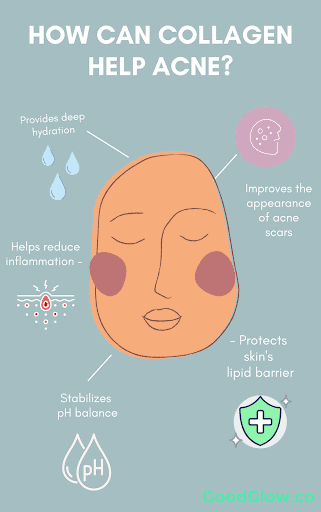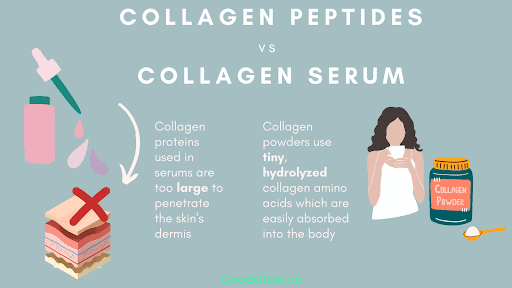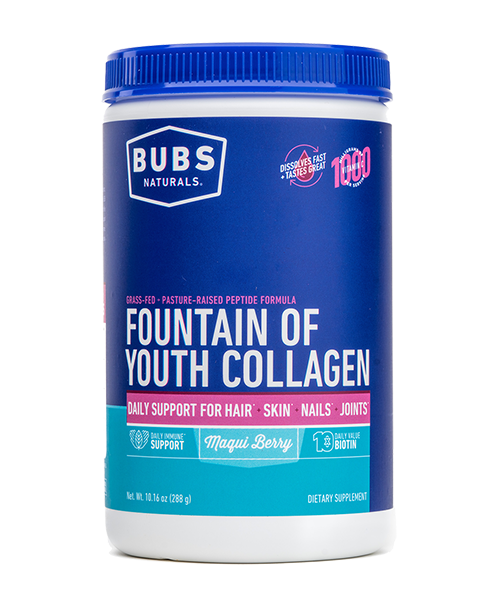With its seemingly endless skin benefits and top-tier ranking in the skincare hierarchy, you
might have asked yourself the question: does collagen help acne? We know that collagen is important when it comes to the aging of the skin and its overall condition, but what are the benefits of collagen for acne sufferers?
In my view, it’s important to be objective when discussing the pros and cons of any skincare product, but this is especially true when it comes to collagen. In this article, I’m going to discuss the benefits and drawbacks of using collagen for acne, and whether or not it really can help those with acne achieve clearer, healthier skin.
What is collagen and its importance in the body?
Collagen is one of the most essential proteins in the body and is responsible for the suppleness, firmness, and overall condition of the skin. You’ll find collagen almost everywhere in the body – in the joints, muscles, organs, skin, and even in the intestinal lining.
Collagen is what keeps skin youthful; we can consider collagen a bit like the body’s natural glue or scaffolding: it helps keep everything in the body together and keeps everything connected, and when it decreases, the body begins to both look and feel frailer. Collagen is super important when it comes to your overall health, but also key when it comes to your skin.

Does Collagen Help With Acne?
Before we can say definitively whether or not collagen helps with acne, it’s important to list and explain the various forms of collagen that are available to buy over the counter. You can buy collagen in the form of a collagen serum, as an oral supplement (such as a pill or capsule), or as a powder – each of these options reports varied results when it comes to skin benefits, and some are better than others when it comes to acne-prone skin.
Does Collagen Serum Help With Acne?
Collagen serums are becoming more popular in the skincare market, as manufacturers harness the name association of collagen to their beauty products. Collagen serum can be great for hydrating the skin and providing a smooth, firmer texture, and can be combined with other active ingredients such as hyaluronic acid, salicylic acid, or other hydrating or exfoliating properties to create a great all-rounder skincare product. Collagen serum is applied topically and can be used up to twice a day as part of a skincare routine.
Benefits of Collagen Serum for Acne:
- Antibacterial – certain collagen serums are infused with ingredients that can help stabilize your pH balance in the skin – if you have acne-prone skin, this is a major plus: having a stable pH balance will make your skin less attractive to bacteria, strengthen your lipid barrier and therefore make your skin less prone to breakouts. It can also help repair the skin and speed up the healing of current breakouts.
- Intense hydration – all of us with acne-prone skin know how important it is to stay hydrated. Dehydrated skin not only causes breakouts, but amplifies existing lines, imperfections, and acne scars. Collagen serums provide deep hydration, helping to prevent this type of breakout.
- Anti-inflammatory – irritation is another key cause of acne breakouts and can trigger an overproduction of oil in the skin. Collagen is known to be highly anti-inflammatory, so can be useful in balancing the skin and keeping it soothed and smoothed.
One downside to collagen serum is that it cannot penetrate the skin’s dermis layer: the collagen protein in any topical serum will be too large and will therefore simply sit atop the skin, unable to fully absorb to allow the skin the full benefits. This makes it unsuitable for encouraging skin cell renewal, which helps get rid of acne scars.
The best way to use a collagen serum is to choose one which has been fortified with other skin-enhancing ingredients. My current go-to collagen serum, CELLRENEW’s Collagen Stem Cell Serum, combines collagen with hyaluronic acid, palmetto, green tea, and reishi mushroom. This combination of ingredients provides a powerful nutrient cocktail for my skin: not only does the green tea balance my oil levels, but the collagen works alongside the palmetto to really strengthen my skin’s lipid barrier and reduce inflammation: with this serum, I haven’t had a breakout in months.
Does Collagen Powder Help With Acne?
Taken like multivitamins, collagen supplements – also described and sold as “collagen peptides” – are hydrolyzed forms of collagen, typically taken in the form of powder mixed into a drink. Many dermatologists consider collagen supplements to be far superior to collagen serums: while collagen serums tend to use large collagen proteins that are far too big to be absorbed into the skin and penetrate the skin’s dermis layer, collagen peptides are smaller, hydrolyzed forms of collagen which can be absorbed fast into the bloodstream and take effect within 1-2 weeks.
Benefits of Collagen Powder for Acne
- Fast, effective absorption – as the collagen in collagen powder is smaller, the body has an easier time absorbing it and sending it into the bloodstream.
- When you take a collagen powder supplement, you’re providing collagen support to the whole body, rather than simply on the face or neck where applied topically.
- Studies have found that ingesting collagen orally can increase the skin’s elasticity and improve the appearance of fine lines – this means that any visible acne scars will also improve in appearance.
- Collagen powders can be safer than collagen serum for those with acne: as you’ll know if you’ve suffered with acne yourself, many topical skincare products can trigger inflammatory outbreaks on the skin.
In my view, I find that taking collagen peptides – i.e., ingesting collagen through a supplement drink – to be much more efficient than applying a collagen serum.
Plus, by using a collagen supplement, you get the full body benefits of collagen, rather than just the skin benefits. That said, I think using both in tandem has really turbo-charged my results.
Currently, my favorite collagen supplement (particularly for blemish-prone skin) is the Bub’s Naturals – Fountain of Youth. The formula features 10 grams of bovine collagen peptides, which not only help with acne scars and texture and promote a more youthful complexion, but also support stronger hair and nails and healthier joints.
Best Collagen Supplement for Acne:
BUBS Naturals – Fountain of Youth Collagen Protein Powder
Animal based, dairy free protein packed with pantothenic acid and vitamin C to help promote skin, hair & nail growth.
GoodGlow Score
Collagen-Based Protein
Formula features animal-based collagen peptides, which are ideal for acne-prone complexions and offer skin, hair, nail, and joint benefits
Potent Vitamin C Concentration
Vitamin C supports the immune system while encouraging collagen production and providing antioxidant benefits for healthy, youthful skin
Contains Vitamin B5
Powder contains pantothenic acid (vitamin B5), which helps keep blemishes at bay
Non-GMO, Dairy-Free, and Gluten-Free
High-quality formula is made without dairy (which can trigger acne), and is also free of GMOs and gluten
Tapioca Starch, Natural Flavors, Organic Stevia Leaf Extract, Silicon Dioxide. Contains: Coconut
Beyond the collagen peptides, what makes this supplement especially great for acne-prone skin is that it has additional ingredients that improve the complexion (and further support overall wellness). This includes vitamin C, the antioxidant that fights damaging free radicals and stimulates the production of natural collagen, as well as vitamin B5, which may help minimize blemishes.
Even better, this powder quickly dissolves into water, protein shakes, and other liquids. This has made it an easy product to work into my routine. It’s also dairy-free (which is ideal for those with acne, since dairy can trigger breakouts), and is non-GMO and gluten-free. I also like that the company has a subscribe and save option, and allows you to pick the frequency at which it is delivered.

Does Collagen Help With Acne Scars?
When it comes to acne scars, it’s important to remember that skin cell turnover is going to be what really makes the difference in your skin: skin cell turnover will replace the old, damaged cells with new ones, which will reduce the appearance of visible acne scarring and help give your skin a more uniform, smooth appearance. But does collagen help with acne scars? It all depends on how you use it.
Does Collagen Serum Help Acne Scars?
Because collagen serum is applied topically to the skin, you might think that it has the best chance of helping improve the appearance of your acne scars. Wrong! As I explained in one of my other blog posts about collagen serum, collagen serums are unable to directly penetrate the skin’s dermis layer and trigger cell turnover – unlike other skincare ingredients such as retinol.
This means that the benefits of collagen serum can be considered to apply uniquely to the skin’s surface. While a collagen serum might be able to provide deep hydration to plump up your scars and make them less visible, it’s not going to dramatically or fundamentally change the skin’s damage. As I explained in one of my articles about increasing collagen production, combining a collagen serum with micro-needling can be a more effective way to treat acne scars.
Does Collagen Powder Help Acne Scars?
If you’re looking to improve the appearance of your acne scars with collagen, the best option is to take a collagen supplement. While I’ve taken both collagen supplements and applied my favorite collagen serum regularly, I know that only one of these products has the capacity to improve the texture of my acne scars and reduce their appearance.
Collagen peptides have been scientifically proven to improve the skin’s elasticity, which encourages skin repair and diminishes the look of scars, wrinkles, and fine lines. Collagen peptides also provide full support to the body’s collagen production, with minimal risk of causing a skin outbreak as it isn’t applied topically. Overall, I’d recommend powder supplements as your best bet for combatting acne scars with collagen.
Collagen Supplement Skin Side Effects
As with any new skincare product or supplement, you should be aware of possible side effects or allergic reactions. As I pointed out in one of my other blog posts, you can actually be allergic to collagen. While collagen is a human substance, collagen supplements are often sourced from animals, which can cause allergic reactions and unpleasant side effects if you’re already an allergy sufferer.
Typical Collagen Allergy Symptoms
- Digestive Problems – if you’re feeling bloated, it might be due to excess collagen in your system. Collagen can take a while to break down, so you might want to reduce your dose if you run into this problem.
- Headaches – collagen contains an amino acid called glutamic acid, which has been often linked to headaches when taken in elevated doses. Reduce your dose if your collagen supplements give you a migraine.
- Anaphylactic Reaction – if you’re already an allergy sufferer (especially if you’re allergic to eggs, fish, or other proteins) seek immediate emergency medical help if you go into anaphylactic shock. Those with severe allergies should opt for a hypoallergenic collagen supplement to be completely safe.
Verdict: Does Collagen Help Acne?
When it comes to treating acne, collagen supplements can provide a helpful boost to the skin’s production of collagen. Collagen can improve both the skin’s elasticity and hydration, making it a great addition to an acne-prone skincare routine and great for improving the appearance of acne scars when taken long-term. However, collagen isn’t an anti-acne treatment. Collagen isn’t going to naturally shrink your pores or remove excess oil from your skin – its main use in an anti-acne routine is to strengthen the skin’s barrier and reduce the appearance of uneven acne scarring.


